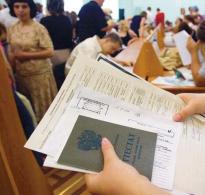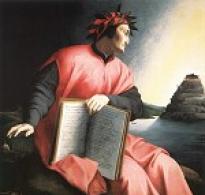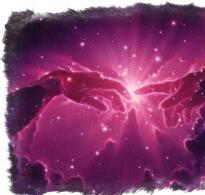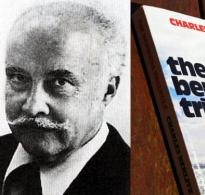Dante alighieri interesting facts from life. The personal life of the poet
Dante was born in mid-May 1265 in Florence. His parents were respectable citizens of modest means and belonged to the Guelph party, which opposed the power of the German emperors in Italy. They were able to pay for their son's education at school, and subsequently allowed him, without worrying about the means, to improve in the art of versification.
As a poet, Dante begins by imitating the most influential lyric poet in Italy at that time, Gwittone d'Arezzo, but soon changes poetics and, together with his older friend Guido Cavalcanti, becomes the founder of a special poetic school, which Dante himself called the school of the "sweet new style" (Dolce style nuovo). Its main distinguishing feature is the ultimate spiritualization of love feelings.
In 1292, Dante wrote an autobiographical story in verse and prose, La vita nuova, which tells of Dante's love for Beatrice (it is believed that this was Beatrice, daughter of Folco Portinari) from the moment they first met when Dante was nine years old. , and she is eight, and until the death of Beatrice in June 1290. The poems are accompanied by prose inserts explaining how this or that poem appeared. In this work, Dante develops the theory of courtly love for a woman, reconciling it with the Christian love for God. After the death of Beatrice, Dante turned to the consolation of philosophy and created several allegorical poems in praise of this new "lady".
In the years 1295-1296, Dante was called up several times for public service, including participation in the Council of the Hundred, which was in charge of the financial affairs of the Florentine Republic.
In 1300, Dante travels as ambassador to San Gimignano, calling on the citizens of the city to unite with Florence against Pope Boniface VIII. In the same year, Dante was elected a member of the governing council of priors - Dante holds this position from June 15 to August 15. Fulfilling it, he is trying to prevent the aggravation of the struggle between the parties of the White Guelphs (who advocated the independence of Florence from the pope) and the Blacks (supporters of papal power).
Around this time, Dante marries Gemma Donati, whose lineage belongs to the Black Guelphs.
In 1301, from April to September, Dante re-enters the Council of the Hundred. In the autumn of the same year, he was part of the embassy sent to Pope Boniface in connection with the attack on Florence by Prince Charles of Valois. In his absence, on November 1, 1301, with the arrival of Charles, power in the city passes to the Black Guelphs, and the White Guelphs are repressed.
On January 27, 1302, Dante, whose sympathies are on the side of the White Guelphs, was sentenced to exile and deprived of civil rights. He no longer returns to Florence.
In the years 1304-1308, the treatise "Feast" (Il convivio) was created, written, according to Dante himself, in order to declare himself as a poet who moved from singing courtly love to philosophical topics. "Feast" is conceived as a kind of encyclopedia in the field of philosophy and art, intended for a wide range of readers.
The name "Feast" is allegorical: simply and clearly stated scientific ideas should saturate not the chosen ones, but everyone. It was assumed that the "Feast" will include fourteen poems (canzone), each of which will be provided with an extensive gloss, interpreting its allegorical and philosophical meaning. However, having written interpretations of the three canzones, Dante leaves work on the treatise. In the first book of the Pira, which serves as a prologue, he passionately defends the right of the Italian language to be the language of literature.
Dante is also working on a treatise in Latin "On Popular Eloquence" (De vulgari eloquentia, 1304-1307), which was not completed: Dante wrote only the first book and part of the second. In it, Dante speaks of Italian as a means of poetic expression, expounds his theory of language, and expresses his hope for the creation in Italy of a new literary language that would rise above dialectal differences and would be worthy of being called great poetry.
In 1307, Dante began to write the Divine Comedy, interrupting work on the treatises The Feast and On Popular Eloquence. Dante calls his poem "Comedy", because it has a gloomy beginning (Hell) and a joyful end (Paradise and contemplation of the Divine essence). In addition, the poem is written in a simple style (as opposed to the sublime style inherent, in the understanding of Dante, tragedy), in the vernacular, "as women speak." The epithet "Divine" in the title was not invented by Dante, it was prefaced by Boccaccio's "Commedia", expressing admiration for the artistic beauty of creation, and for the first time it appears in an edition published in 1555. in Venice.
The poem consists of one hundred songs of approximately the same length (130-150 lines) and is divided into three cants - "Hell", "Purgatory" and "Paradise", thirty-three songs each; the first song of "Hell" serves as a prologue to the whole poem. The size of the “Divine Comedy” is an eleven-syllable, rhyming scheme, tercine, invented by Dante himself, who put a deep meaning into it.
The Divine Comedy is an unsurpassed example of art as imitation; Dante takes as a model everything that exists, both material and spiritual, created by the triune God, who left the imprint of his trinity on everything. Therefore, the structure of the poem is based on the number three, and the amazing symmetry of its structure is rooted in imitation of the measure and order that the Lord gave to all things.
Although the narrative of The Comedy can almost always be based on the literal sense alone, this is by no means the only level of perception. Following the medieval tradition, Dante puts four meanings into his work: literal, allegorical, moral and anagogical (mystical). The first of them involves a "natural" description of the afterlife with all its attributes. The second meaning involves the expression of the idea of being in its abstract form: everything in the world moves from darkness to light, from suffering to joy, from error to truth, from bad to good.
The main idea can be considered the ascent of the soul through the knowledge of the world. The moral meaning implies the idea of retribution for all earthly deeds in the afterlife. The anagogical meaning presupposes the comprehension of the Divine idea through the perception of the beauty of poetry itself, as the language of the Divine too, although created by the mind of a poet, an earthly man.
In 1310, Emperor Henry VII invades Italy with a "peacekeeping" purpose. To this event, Dante, who by that time had found temporary shelter in Casentino, responds with an ardent letter “To the rulers and peoples of Italy”, calling for support for Henry. In another letter, entitled "The Florentine Dante Alighieri, unjustly expelled, to the worthless Florentines who remained in the city," he condemns the resistance offered by Florence to the emperor.
In 1312-1313, a treatise-study "On the Monarchy" (De monarchia) was written. Here, in three books, Dante seeks to prove the truth of the following statements:
1) only under the rule of a single universal monarch can humanity come to a peaceful existence and fulfill its destiny;
2) The Lord chose the Roman people to rule the world (therefore, this monarch must be the emperor of the Holy Roman Empire);
3) the emperor and the pope receive power directly from God (therefore, the first is not subordinate to the second).
These views were expressed even before Dante, but he brings to them the ardor of conviction. The Church immediately condemns the treatise and sentences the book to be burned.
In 1313, after an unsuccessful three-year campaign, Henry VII died suddenly in Buonconvento. And in 1314, after the death of Pope Clement V in France, Dante comes out with another letter addressed to the conclave of Italian cardinals in the city of Carpentras, in which he urges them to elect an Italian pope and return the papal throne from Avignon to Rome.
For some time, Dante takes refuge with the ruler of Verona, Can Grande della Scala, to whom he dedicates the final part of the Divine Comedy - Paradise.
The poet spends the last years of his life under the patronage of Guido da Polenta in Ravenna.
In the last two years of his life, Dante wrote two eclogues in Latin hexameter. This was an answer to the professor of poetry at the University of Bologna, Giovanni del Virgilio, who urged him to write in Latin and come to Bologna to be crowned with a laurel wreath. The study "The Question of Water and Land" (Questio de aqua et terra), dedicated to the controversial issue of the ratio of water and land on the surface of the Earth, Dante may have read publicly in Verona. Of the letters to Dante, eleven are recognized as authentic, all in Latin (some have been mentioned).
September 13, 1321 Dante dies in Ravenna, having completed the Divine Comedy shortly before his death.
On May 21, 1265, one of the founders of the literary Italian language, the greatest poet, theologian, politician, who entered the history of world literature as the author of the Divine Comedy, was born. Dante Alighieri.
The Alighieri family belonged to the middle-class urban nobility, and his ancestor was the famous knight Kachchagvid, who died in the second crusade in 1147. The full name of the legendary poet is Durante degli Alighieri, he was born in Florence, the largest Italian economic and cultural center of the Middle Ages, and remained devoted to his hometown all his life. Little is known about the writer's family and life, even the exact date of his birth is questioned by many researchers.
Dante Alighieri was an amazingly confident man. At the age of 18, the young man said that he could write poetry perfectly and that he had mastered this “craft” on his own. Dante was educated within the framework of medieval school programs, and since there was no university in Florence at that time, he had to acquire basic knowledge himself. The author of The Divine Comedy mastered French and Provençal, read everything that came to hand, and little by little his own path as a scientist, thinker and poet began to be drawn before him.
exiled poet
The youth of the brilliant writer fell on a difficult period: at the end of the 13th century, the struggle between the emperor and the pope intensified in Italy. Florence, where the Alighieri lived, was divided into two opposing groups - "blacks" led by Corso Donati and the "whites" to which Dante belonged. Thus began the political activity of the “last poet of the Middle Ages”: Alighieri participated in city councils and anti-papal coalitions, where the writer’s oratorical gift was manifested in all its splendor.
Dante was not looking for political laurels, but political thorns soon overtook him: the “blacks” activated their activities and pogromed opponents. On March 10, 1302, Alighieri and 14 other "white" supporters were sentenced to death in absentia. To escape, the philosopher and politician had to flee from Florence. Never again did Dante manage to return to his beloved city. Traveling around the world, he was looking for a place where he could retire and work quietly. Alighieri continued to study and, most importantly, create.
monogamous poet
When Dante was nine years old, a meeting took place in his life that changed the history of all Italian literature. On the threshold of the church, he ran into a little girl next door Beatrice Portinari and fell in love with the young lady at first sight. It was this tender feeling, according to Alighieri himself, that made him a poet. Until the last days of his life, Dante dedicated poems to his beloved, idolizing "the most beautiful of all angels." Their next meeting took place nine years later, by this time Beatrice was already married, her husband was a rich signor Simon de Bardi. But no bonds of marriage could prevent the poet from admiring his muse, she remained "the mistress of his thoughts" all his life. The poetic document of this love was the autobiographical confession of the writer "New Life", written at the fresh grave of his beloved in 1290.
Dante himself entered into one of those politically calculated business marriages that were accepted at that time. His wife was Gemma Donati, daughter of a wealthy gentleman Manetto Donati. When Dante Alighieri was expelled from Florence, Gemma remained in the city with the children, preserving the remnants of her father's property. Alighieri does not mention his wife in any of his works, but Dante and Beatrice have become the same symbol of a love couple as petrarch and Laura, Tristan and Isolde, Romeo and Juliet.
Dante and Beatrice on the banks of the Lethe. Cristobal Rojas (Venezuela), 1889. Photo: Commons.wikimedia.org
Italian "Comedy"
The death of Beatrice marked the beginning of Dante's philosophical reflections on life and death, he began to read a lot Cicero attend a religious school. All this served as an impetus for the creation of the Divine Comedy. A brilliant work created by the author in exile, and today is traditionally included in the top ten most famous books. Dante's poem had a huge impact on the emergence of proper Italian literature. According to researchers, it is this work that summarizes the entire development of medieval philosophy. It also reflects the worldview of the greatest poet, so the Divine Comedy is called the fruit of the life and work of the Italian master.The "divine" comedy of Alighieri did not immediately become, as the author of the "Decameron" later dubbed it Giovanni Boccaccio, having come in admiration from what he read. Dante called his manuscript very simply - "Comedy". He used medieval terminology, where comedy is “any poetic work of the middle style with a frightening beginning and a happy ending, written in the vernacular”; Tragedy is “any poetic work of high style with an admiring and calm beginning and a terrible end.” Despite the fact that the poem touches on the “eternal” themes of life and the immortality of the soul, retribution and responsibility, Dante could not call his work a tragedy, because, like all genres of “high literature”, it had to be created in Latin. Alighieri wrote his Comedy in his native Italian, and even with the Tuscan dialect.
Dante worked on the greatest poem for almost 15 years, having managed to complete it shortly before his death. Alighieri died of malaria on September 14, 1321, leaving behind a significant mark in world literature and marking the beginning of a new era - the early Renaissance.
Dante Alighieri (1265-1321). Biography in dates and facts
Dante Alighieri (1265-1321). Biography in dates and facts
Dante Alighieri- the legendary Italian poet and thinker, the author of the famous poem "", included in the first row of the "golden fund" of world literature. In the history of national culture, Dante also played the role of the founder of the Italian literary language.
1265
AT
1274
There is reason to believe that Dante studied at the University of Bologna, where he practiced versification and communicated with recognized poets of his time, and later became addicted to philosophy, willingly attending debates on theological topics. It is known that he married a girl from a wealthy Florentine family, Gemma Donati, who bore him four children.
1295
1301
Between
1304 and 1307
1307
Approximately
1312-1313
AT
1311
1315
Dante Alighieri (1265-1321). biography in dates and facts
Dante Alighieri- the legendary Italian poet and thinker, the author of the famous poem "The Divine Comedy", included in the first row of the "golden fund" of world literature. In the history of national culture, Dante also played the role of the founder of the Italian literary language.
Dante's life in dates and facts:
1265- was born in Florence in a family belonging to the urban nobility.
AT
1274 Dante, according to his own testimony, first saw Beatrice, who became the love of his life. To the beautiful Beatrice, who passed away early, he dedicated a separate cycle of poems, dated by scientists around 1283-1292. By 1292, his lyrical confession "New Life", which included poetic works dedicated to Beatrice, dates back.
There is reason to believe that Dante studied at the University of Bologna, where he practiced versification and communicated with recognized poets of his time, and later became addicted to philosophy, willingly attending lectures and debates on theological topics. It is known that he married a girl from a wealthy Florentine family, Gemma Donati, who bore him four children.
1295- the beginning of the socio-political activities of Dante. Subsequently, he held various positions in the city self-government system (including the prior, one of the main elected persons), was a member of city councils, and also participated in the political struggle.
1301- due to political repression, the poet was expelled from Florence with a warning that if he returned, he would be burned at the stake. From that time began a period of wandering, which lasted until the end of his life. For some time Dante lived in Verona, then, presumably, in Bologna; probably made a trip to Paris, stayed for two years in Pisa, and spent the rest of his life in Ravenna.
Between
1304 and 1307- wrote the philosophical essay "Feast" (remained unfinished) and the philological treatise "On the Folk Language".
1307- began working on the poem "The Divine Comedy", which he completed shortly before his death.
Approximately
1312-1313- wrote a political treatise "On the Monarchy".
AT
1311 the political situation in Florence changed, and the city authorities took the initiative to pardon the exiles: the former convicts were granted the right to return to their homeland, subject to bail. Contrary to the advice of his Florentine friends, the poet refused to return to his homeland in a humiliating way, "belittling Dante's glory and honor." He did the same with the second proposal made to him in
1315 Then the signoria outlawed Dante and sentenced him in absentia along with his sons to beheading.
His "Divine Comedy" is studied at school and passed as a compulsory program in higher educational institutions: institutes, universities. He was one of the greatest Italian poets and thinkers. In addition, being the founder of the literary Italian language, he was involved in politics. Dante Alighieri accompanied interesting facts throughout his life.
Facts from the life of Dante Alighieri
Very little is known about the life of the poet, and only from the words of the thinker himself. Born in Florence in 1265, the writer remained faithful to his city, which he loved and called the best in the world. Dante does not mention the family at all. Other sources suggest that little Alighieri lost his parents early. First, the mother died. The father, after marrying another woman, has two more children. But the happiness of the new family did not last long, the head of the family dies, and all the burden of household chores falls on the shoulders of young Dante.
The best friend of the future poet was Brunetto Latini, who contributed to the development of Alighieri's talent. He, being an excellent encyclopedist and an intelligent person, always gave wise advice to the young writer and brought up in him a sense of beauty. It is not for nothing that Brunetto is called the teacher of Dante Alighieri.
Not the last role in the formation of Dante, as a famous poet, was played by his friend Cavalcanti. The relationship between them was very difficult, since Alighieri involuntarily participated in the exile of a friend. Guido contracted malaria and died in 1300. After his death, Dante dedicated many poems to Cavalcanti.
Love Dante
Every schoolchild knows the great work of the Italian writer Dante "The Divine Comedy". It is in this work that Alighieri sings of his first true love, the beautiful Beatrice. Subsequently, this couple became a symbol of tender love. Often young people are put on a level next to Romeo and Juliet, Tristan and Isolde.
Beatrice died at the age of twenty-five. The love between a girl and Dante deserves to be on the pages of some fairy tale. For the first time, Dante saw little Beatrice when he was nine years old, but he really fell in love only after 9 years, when he saw a young, beautiful, but already married girl. From this very moment, Beatrice becomes the center of the universe for the poet. Throughout his life, even after the death of his beloved, the poet dedicates all his poems to Beatrice.
The most striking image in the literature of Dante Beatrice appeared in his famous "Divine Comedy".
DANTE Alighieri (Dante Alighieri) (1265-1321), Italian poet, creator of the Italian literary language. In his youth, he joined the school "Dolce style Nuovo" (sonnets in praise of Beatrice, the autobiographical story "New Life", 1292-93, edition 1576); philosophical and political treatises ("Feast", not finished; "On the People's Speech", 1304-07, edition 1529), "Messages" (1304-16). The pinnacle of Dante's work is the poem "The Divine Comedy" (1307-21, edition 1472) in 3 parts ("Hell", "Purgatory", "Paradise") and 100 songs, a poetic encyclopedia of the Middle Ages. He had a great influence on the development of European culture.
DANTE Alighieri(May or June 1265, Florence - September 14, 1321, Ravenna), Italian poet, one of the greatest geniuses of world literature.
Biography
The Dante family belonged to the urban nobility of Florence. The family name Alighieri (in a different voicing of Alagieri) was the first to be worn by the poet's grandfather. Dante was educated at a municipal school, then, presumably, studied at the University of Bologna (according to even less reliable information, he also attended the University of Paris during his exile). He took an active part in the political life of Florence; from June 15 to August 15, 1300, he was a member of the government (he was elected to the post of prior), trying, while acting, to prevent the aggravation of the struggle between the parties of the White and Black Guelphs (see Guelphs and Ghibellines). After an armed coup in Florence and the coming to power of the Black Guelphs, on January 27, 1302, he was sentenced to exile and deprived of civil rights; On March 10, he was sentenced to death for failing to pay a fine. The first years of Dante's exile - among the leaders of the White Guelphs, takes part in the armed and diplomatic struggle with the winning party. The last episode in his political biography is connected with the Italian campaign of Emperor Henry VII (1310-13), whose efforts to establish civil peace in Italy he gave ideological support in a number of public messages and in the treatise "Monarchy". Dante never returned to Florence, spent several years in Verona at the court of Can Grande della Scala, the last years of his life enjoyed the hospitality of the ruler of Ravenna, Guido da Polenta. Died of malaria.
Lyrics
The main part of Dante's lyrical poems was created in the 80-90s. 13th century; with the beginning of the new century, small poetic forms gradually disappear from his work. Dante began by imitating the most influential lyric poet in Italy at that time, Gwittone d'Arezzo, but soon changed poetics and, together with his older friend Guido Cavalcanti, became the founder of a special poetic school, which Dante himself called the school of the "sweet new style" ("Dolce style nuovo" ). Its main distinguishing feature is the ultimate spiritualization of love feeling. Poems dedicated to his beloved Beatrice Portinari, Dante, having provided biographical and poetic commentary, collected in a book called "New Life" (c. 1293-95). : two meetings, the first in childhood, the second in adolescence, denoting the beginning of love, the death of Beatrice's father, the death of Beatrice herself, the temptation of a new love and overcoming it.The biography appears as a series of mental states leading to an ever more complete mastery of the meaning of the hero of feeling that has befallen: in as a result, the feeling of love acquires the features and signs of religious worship.
In addition to the "New Life", about fifty more poems by Dante have come down to us: poems in the manner of the "sweet new style" (but not always addressed to Beatrice); the love cycle, known as the "stone" (after the name of the addressee, Donna Pietra) and characterized by an excess of sensuality; comic poetry (poetic squabble with Forese Donati and the poem "Flower", the attribution of which remains doubtful); a group of doctrinal poems (dedicated to the themes of nobility, generosity, justice, etc.).
Treatises
Poems of philosophical content became the subject of commentary in the unfinished treatise "Feast" (c. 1304-07), which is one of the first experiments in Italy to create scientific prose in the vernacular and at the same time the rationale for this attempt - a kind of educational program along with the defense of the vernacular. language. In the unfinished Latin treatise "On Popular Eloquence", written in the same years, the apology of the Italian language is accompanied by the theory and history of literature in it - both of which are absolute innovations. In the Latin treatise "Monarchy" (c. 1312-13), Dante (also for the first time) proclaims the principle of separation of spiritual and secular power and insists on the full sovereignty of the latter.
 "The Divine Comedy"
"The Divine Comedy"
Over the poem "The Divine Comedy" Dante began to work during the years of exile and finished it shortly before his death. Written in tercini, containing 14,233 verses, it is divided into three parts (or canticles) and one hundred cantos (each canticle contains thirty-three songs, and one more is introductory to the whole poem). It was called a comedy by the author, who proceeded from the classification of genres worked out by medieval poetics. The definition of "divine" was given to her by her descendants. The poem tells about Dante's journey through the realm of the dead: the right to see the afterlife during his lifetime is a special favor that saves him from philosophical and moral delusions and imposes on him a certain high mission. Dante, lost in the "gloomy forest" (which symbolizes a specific, although not directly named sin of the author himself, and at the same time - the sins of all mankind, experiencing a critical moment in its history), comes to the aid of the Roman poet Virgil (who symbolizes the human mind, unfamiliar with divine revelation) and leads him through the first two kingdoms beyond the grave - the kingdom of retribution and the kingdom of redemption. Hell is a funnel-shaped failure ending in the center of the earth, it is divided into nine circles, in each of which an execution is performed on a special category of sinners (only the inhabitants of the first circle - the souls of unbaptized babies and righteous pagans - are spared from torment). Among the souls that Dante met and entered into a conversation with him, there are those who are personally familiar to him and there are known to everyone - characters of ancient history and myths, or heroes of our time. In The Divine Comedy they are not turned into direct and flat illustrations of their sins; the evil for which they are condemned is difficult to combine with their human nature, sometimes not devoid of nobility and greatness of spirit (among the most famous episodes of this kind are meetings with Paolo and Francesca in the circle of voluptuaries, with Farinata degli Uberti in the circle of heretics, with Brunetto Latini in circle of rapists, with Ulysses in the circle of deceivers, with Ugolino in the circle of traitors). Purgatory is a huge mountain in the center of the uninhabited ocean-occupied southern hemisphere, it is divided by ledges into seven circles, where the souls of the dead atone for the sins of pride, envy, anger, despondency, avarice and extravagance, gluttony, voluptuousness. After each of the circles, one of the seven signs of sin inscribed by the gatekeeper angel is erased from the forehead of Dante (and any of the souls of purgatory) - in this part of the "Comedy" it is sharper than in others, it is felt that Dante's path for him is not only acquainting but also redemptive. On a mountaintop, in an earthly paradise, Dante meets Beatrice (symbolizing divine revelation) and parted ways with Virgil; here, Dante is fully aware of his personal guilt and is completely cleared of it. Together with Beatrice, he ascends to paradise, in each of the eight heavens surrounding the earth (in seven planetary and in the eighth starry) he gets acquainted with a certain category of blessed souls and becomes stronger in faith and knowledge. In the ninth heaven of the Prime Mover, and in the Empyrean, where Beatrice replaces St. Bernard, he is honored with initiation into the mysteries of the Trinity and the Incarnation. Both plans of the poem finally merge, in one of which the path of a person to truth and goodness through the abyss of sin, despair and doubt is presented, in the other - the path of history, which has come to the last frontier and opens towards a new era. And the Divine Comedy itself, being a kind of synthesis of medieval culture, turns out to be the final work for it.





